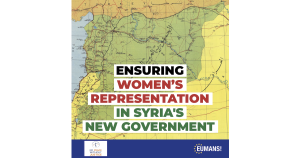Although Yemen has been among the first countries in the region to follow the Tunisian example and started a pacific and nonviolent struggle to reform national institutions and remove the corrupt and violent regime of former President Saleh, which ruled the country through coercion and repression of basic human rights for 30 years, the path toward democracy is still long. Certainly the main goal of the Yemeni Arab Spring, the ousting of President Saleh and the inception of a democratic process have been achieved. The poverty of the country and its political landscape, if possible more complex and daunting than its geographical configuration, are still factors that are hampering the swift and complete achievement of the Yemeni population’s aspirations.
The international community is watching events carefully in that country, not only because of its geopolitical position at the mouth of the Red Sea but also because 30 years of corruption and tribalistic management of politics have created a breeding ground for terroristic elements and no hailing for one of the poorest populations on earth, by many still considered on the brink of failing.
Yet, the hope that the courageous youth and the vibrant civil society will manage to achieve their goals is still strong and enormous developments have take place in the last 18 months in that country. Indeed, the massive popular demonstrations and sit-ins in the major cities of Yemen and the nonviolent response of civil society and democracy advocates to the bullets and knifes of Saleh’s army and goons are signs of political maturity. Furthermore, the raise of political figures such as Ms. Tawakkol Karman, who received the 2011 Nobel Prize and became not only a main actor in the struggle for democracy in Yemen, represents a symbol for all Arab women struggling for a better future for them and their countries.
Further to the presidential elections in February 2012 and the ousting of Mr Saleh from the Presidential Palace, the new government is now struggling to implement the second phase of the Transitional Agreement, brokered last year by the Gulf Cooperation Council and backed by the United Nations in two Security Council Resolutions. Resolution 2051 – adopted on 12 June, outlines the following goals: (1) seek the creation of a all-inclusive and comprehensive process of national dialogue, aimed at composing the different forces at play in the country and mainly to solve the increasing risk of a partition of the country between the north and the south regions and to find a solution to the decennial war with the Houtis on the north border with Saudi Arabia; (2) initiate a process of national reconciliation through transitional justice mechanisms; and (3) support constitutional and electoral reforms that should lead to general elections by February 2014.
Achieving these goals will be difficult and challenging, also because elements from the past-regimes are still actively working to boycott the democratic process and continue to keep the country on the brink of the collapse, through intimidation and terrorist attacks against governmental forces and representatives. To avoid this scenario, Resolution 2051 expresses the Council’s readiness to consider further measures, including under Article 41 of the United Nations Charter, if such actions continue. This could be a bold move by the members of the Security Council, although it is difficult to imagine how a regime of sanctions imposed on an already impoverished and divided country can be of any help to strengthen and reinforce the democratic process in Yemen.
If the international community is serious about its commitment to Yemen and to the transition to democracy and the rule of law in that country, a deep and holistic process of transitional justice needs to be supported and initiated immediately. This process could also foresee the referral to the International Criminal Court of those entities and individuals that in the last 18 months have been terrorising the population and that still have powerful leverages to block the reform process.
The next months will be critical for Yemen and for the future of the Arab Spring too. Indeed, if the second phase of the transition will work; if a new constitution and electoral law will be drafted on the basis on the needs of the country and of the population, without room for caretakers and undemocratic powers to meddle in the democratic process and keep democracy hostage to past and future interests, as sadly it is happening in these hours in Cairo; if impunity will end and those bearing the greatest responsibility for the abuses of the last 18 months will be prosecuted, the political landscape in Yemen will change offering an example for other countries, such as Libya or even Syria, for a transition to open and democratic institutions.
* Gianluca Eramo is the MENA Democracy Program Coordinator and head of New York Office of NPWJ




